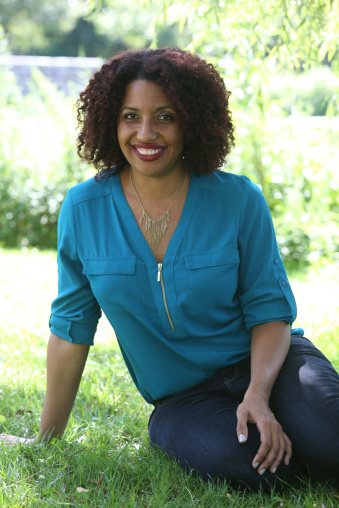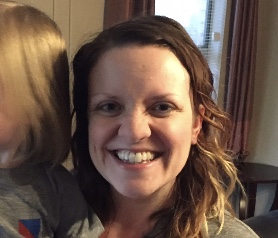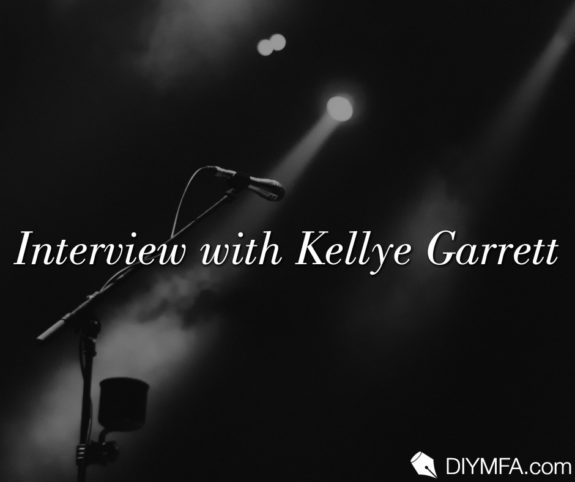Today’s #OwnVoices installment is an interview with Kellye Garrett, author of the award-winning “Detective by Day” mystery series. Kellye and Sara talk about the influence of her TV writing days on her books, the difficulties of writing humor, and Crime Writers of Color, a writers’ group she co-founded with Gigi Pandian and Walter Mosley.
About Kellye Garrett

Kellye Garrett’s Hollywood Homicide, about a semi-famous, mega-broke black actress, won the Anthony, Agatha, Lefty, and IPPY for best first novel. It’s also one of BookBub’s
“Top 100 Crime Novels of All Time.” The second, Hollywood Ending, was featured on the TODAY show’s Best Summer Reads of 2019 and was nominated for both Anthony and Lefty awards. She serves on Sisters in Crime’s national board and is a co-founder of Crime Writers of Color. Her next project is an #ownvoices domestic suspense novel about a woman looking into the overdose death of a one-time reality star found within blocks of her house—her own estranged younger sister. Learn more at KellyeGarrett.com.
The Interview
Sara Farmer: I was very excited to see that you wrote for Cold Case, one of my favorite crime shows. Were any of the characters or events in the “Detective by Day” books inspired by your time as a TV writer?
Kellye Garrett: The characters and events were more inspired by my time working in Hollywood in general more than working as a TV writer. On the flipside, I definitely transferred skills I learned both getting my MFA in screenwriting from the University of Southern California’s film school and working in TV to my books, though.
One example I learned in film school is that your second act needs to answer a question, so I tweaked that for the three-act structure in my books where each act has a question that’s answered by the end of the act, but leads to a new question in the next act.
Another is that television has what’s called an Act Out, where the last scene before a commercial break (remember those?) is a climax to ensure you sit through the commercials and keep watching. I try to end each chapter on a climactic moment, so hopefully the reader is like, “Let me just read one more chapter.”
Sara: The humor in the books is impressive and a huge part of what makes them so fun to read. Writing humor is tough. Dayna has big, goofy, I Love Lucy-type moments, but there is also a steady hum of humor through most of the scenes and dialogue. How do you come up with the recurring jokes and humorous themes for your characters (like Sienna’s shopping and Emme’s devotion to tech) and the big slapstick scenes? (I like how Dayna says “Blurg” when she’s frustrated. I do that, too.)
Kellye: That’s probably because of my screenwriting background as well. I did a lot of character work before I started writing the series and it was important for it to serve the story as well. In a lot of TV procedurals, each character has a specialty, like the person good at tech. So, I thought about how could I make my tech person unique and fit the lighter tone of the book. I came up with a character who “lives online,” because every time she leaves the house she gets mistaken for her super-famous sister.
Plus, Dayna isn’t Tom Cruise. This isn’t Mission Impossible. She’s not going to be an amazing investigator out the gate. So, I wanted to lean into that idea of having fun with her rookie mistakes.
Even the “blurg” was from the character and tone. Lighter-weight mysteries don’t have a lot of on-page violence, sex, or cursing. So, I leaned into that as well where Dayna specifically doesn’t curse. I got the phrase “Blurg” from 30 Rock!)
Sara: Dayna’s relationship with her investigating partner Aubrey S. Adams-Parker is a delight. I love the way they bond and begin to help each other. He exhibits what I consider to be hallmarks of Asperger’s syndrome: very literal, trouble with social norms (like not barging into cars uninvited), and the consistent formality of his speech. Does he have Aspergers? (My son and I have it, so I’m pretty alert to any signs of it in a character.)
Kellye: You’re not the first person to ask me this question. I wish I could say that yes, I set out to create a character with Aspergers, but I didn’t. That’s not to say he doesn’t have Aspergers, just that my intent wasn’t to write a character who has it. He organically grew from needing a “cop” like character in the story, but not wanting to go the traditional tough guy route. It started because Dayna uses humor as a crutch, so I wanted to create a foil for that. So that was the base, then I added layers until we had Aubrey S. Adams-Parker. (The S is only there, because each main character’s full name is an acronym. He’s ASAP.)
Sara: You, Gigi Pandian, and Walter Mosley founded the group Crime Writers of Color. Could you tell us a little bit about the group and the work it does? How did you three end up creating this group together?
Kellye: I got my agent through an online mentoring program called Pitch Wars, where more established authors and publishing pros help an unagented writer revise their manuscript. And one of my fellow mentees formed a Mentee group on Facebook. Around that time, I also joined the Guppies chapter of Sisters in Crime, which Sisters in Crime started for unpublished members. Both those groups helped me understand the importance of community. I was really surprised that there wasn’t already a group like Crime Writers of Color.
Gigi was one of the first published authors to reach out when I got my initial book deal. She answered questions and offered to blurb my book. We discussed possibly starting a group for marginalized crime writers and started informally discussing it with other crime writers of color.
Then Naomi Hirahara very randomly told me that Walter Mosley also wanted to start a group. I remember thinking, “Great, but in what world would I ever cross paths with Walter Mosley?” But the universe was on my side because a couple weeks later, I got invited to do a panel with him. I remember thinking, “If I get to talk to him, I’m going to tell him I want to start a group.” To his credit, he asked for my contact info and reached out. He’s actually the one who came up with the name.
Once we started the group, all three of us reached out to other crime writers of color we knew, so we had about 30 people in the group from the beginning and it grew from there. Today we have over 200-plus members in all stages of their careers.
Sara: How long did it take you to write your first novel? Do you have drawer novels?
Kellye: I wanted to write a book since I was five, so thirty years? Lol. If you want to get literal, I had the idea around 2010-11 and started actually writing in 2011 NaNoWriMo. (I got about 30,000 words.) I finished a draft in 2012, but kept revising. I got into Pitch Wars in 2014. We didn’t sell the book until early 2016 and it came out in 2017. So obviously I was an overnight success. :-p
The only drawer novel I have is the third book of the series, because I was about 75% finished when I abruptly found out my publisher was closing their mystery imprint.

Sara Farmer lives in Austin, TX, with her husband, three kids, and two cats. When she’s not chasing kids and cats, she reads and writes mysteries. You can find her at www.kittymomma.com and on Twitter @avonlea79.







